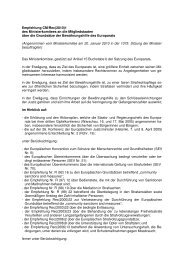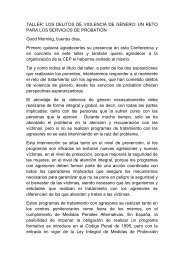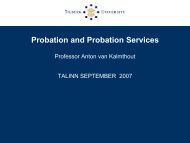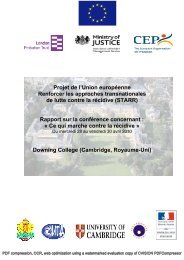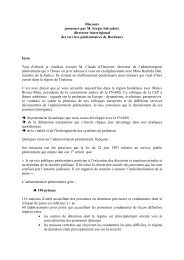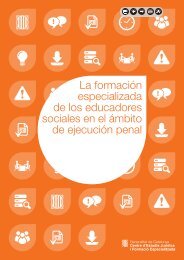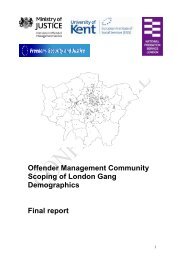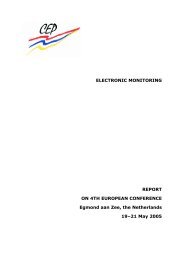Monitoring Hate Crime - CEP, the European Organisation for ...
Monitoring Hate Crime - CEP, the European Organisation for ...
Monitoring Hate Crime - CEP, the European Organisation for ...
Create successful ePaper yourself
Turn your PDF publications into a flip-book with our unique Google optimized e-Paper software.
criminal discrimination. There must happen spectacular incidents indeed, be<strong>for</strong>e <strong>the</strong> freedom<br />
of speech can be affected, may it just be indirectly.<br />
There is also a third reason pleading against <strong>the</strong> term “hate crime” namely <strong>the</strong> inevitable<br />
relation of reactions and actions. In <strong>the</strong> case of “hate crime” <strong>the</strong> term suggests something<br />
extraordinary mean and wrong and automatically causes a subconscious urge to use<br />
corresponding reactions that can easily be overreactions. The risk of overreaction might not<br />
be extremely high in prosecuting and sentencing, but possibly in connection with detecting<br />
activities by <strong>the</strong> police and even more in reporting about “hate crime” in <strong>the</strong> media. The last<br />
being of great influence on public opinion and able to cause unrealistic, eventually even very<br />
exaggerated views that can bring on commotion, feelings of insecurity and hostility against<br />
certain groups in society. These emotions can also result in aggression and violence, perhaps<br />
also in feeling <strong>the</strong> need of making one’s own justice, all reactions that are a threat <strong>for</strong><br />
community life and <strong>the</strong>re<strong>for</strong>e must be prevented.<br />
In <strong>the</strong> title of this paper I con<strong>for</strong>med with <strong>the</strong> title of this conference, although I am convinced<br />
that it is more adequate and not only from a legal, but also from a psychological point of view<br />
better to use <strong>the</strong> term “criminal discrimination” instead of <strong>the</strong> term “hate crime”.<br />
3. What is Criminal Discrimination<br />
3.1 Criminal Discrimination as defined by <strong>the</strong> Dutch Penal Code<br />
In <strong>the</strong> Dutch Penal Code several important terms are defined in <strong>the</strong> Art. 78 – Art. 90octies.<br />
Art. 90quater explains what <strong>the</strong> meaning of “discrimination” is. It reads as follows:<br />
“Discrimination or to discriminate must be understood as every kind of distinction, every<br />
exclusion, restriction or preference that has <strong>the</strong> aim or can have <strong>the</strong> consequence that <strong>the</strong><br />
recognition, <strong>the</strong> use or <strong>the</strong> practice on equal terms of human rights and fundamental political,<br />
economic, social or cultural freedoms or of liberties in o<strong>the</strong>r fields of social life is, undone or<br />
affected” (Art. 137c – Art. 137g , Art. 429 quarter Dutch Penal Code). 8<br />
In <strong>the</strong> Art. 137c – Art. 137g mainly <strong>the</strong> following is criminalized:<br />
8 Art. 90quater:<br />
“Onder discriminatie of discrimineren wordt verstaan elke vorm van onderscheid, elke uitsluiting, beperking of<br />
voorkeur, die ten doel heeft of ten gevolg kan hebben dat de erkenning, het genot of de uitoefening op voet van<br />
gelijkheid van de rechten van de mens en de fundamentele vrijheden op politiek, economisch, sociaal of<br />
cultureel terrein of op andere terreinen van het maatschappelijke leven, wordt teniet gedaan of aangetast.”<br />
3


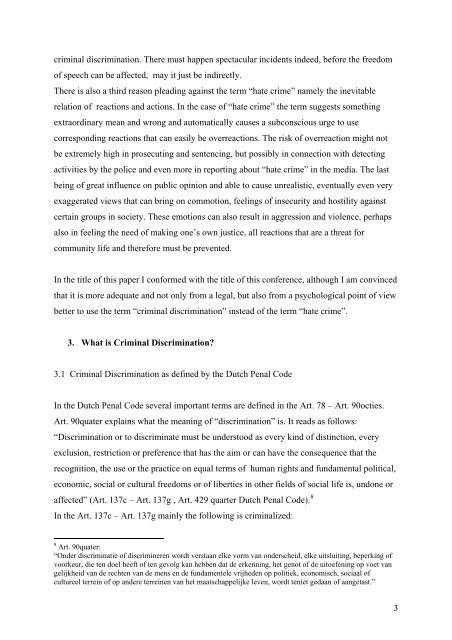
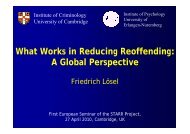
![AGIS2 Nov 08 Conference Report_[Version 2] - CEP, the European ...](https://img.yumpu.com/50764570/1/190x245/agis2-nov-08-conference-report-version-2-cep-the-european-.jpg?quality=85)
